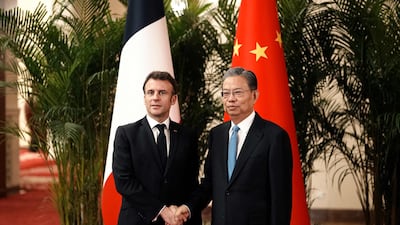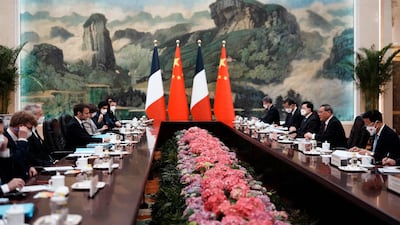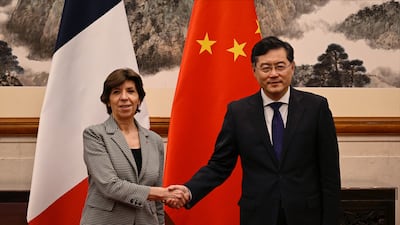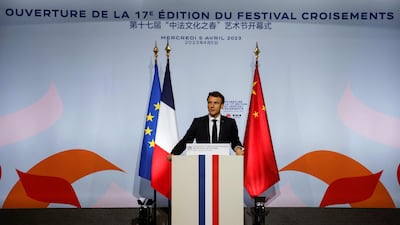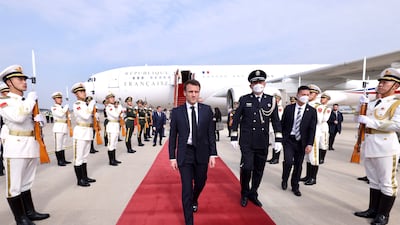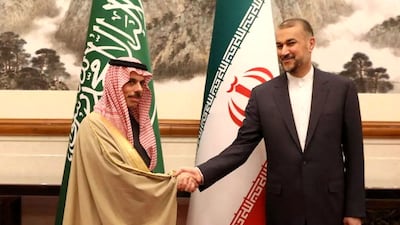Before 1979: Ties between the states were established in 1929, but relations were strained over differences matters including Iran’s recognition of Israel.
1979: Iran’s revolution established a theocratic republic, which caused tensions with Saudi Arabia as the new leadership criticised the kingdom.
1980s: With Saudi Arabia supporting Baghdad in the Iran-Iraq War, the relationship reached its nadir but the countries kept official channels open.
1987: On July 31, Iranian-led demonstrators were involved in dealy violence with Saudi security forces during Hajj. In response, crowds attacked the Saudi embassy in Tehran, leading Riyadh to cut the number of Iranians permitted to undertake the pilgrimage and sever ties fully in April 1988. Iran did not permit citizens to take part in Hajj for three years.
1989: Towards the end of the Iran-Iraq War, King Fahd urged Iraq to accept the UN Security Council resolution to impose a ceasefire and in 1989, Iranian president Hashemi Rafsanjani announced that indirect talks were being held with Riyadh to improve relations.
1991: Iran and Saudi Arabia condemned Iraq’s invasion of Kuwait, improving relations, which were officially restored in 1991. Saudi authorities allowed 115,000 Iranians to attend Hajj that year and invited 5,000 relatives of those killed in the 1987 violence.
Saudi Arabia welcomed the US-led opposition to Iraq’s invasion of Kuwait, while Iran was neutral.
1996: On June 23, a lorry bomb outside the US barracks in Dhahran, Saudi Arabia, killed 19 soldiers and hurt hundreds. The US blamed Iran, but Saudi Arabia did not openly do so.
1997: Saudi Arabia’s then Crown Prince Abdullah bin Abdulaziz and foreign minister Prince Saud bin Faisal attend the Organisation of Islamic Co-operation, helping to improve ties.
1998: Iranian President Mohammad Khatami visited Saudi Arabia, marking the first presidential-level visit between the two countries.
1999: Spurred by Opec co-operation, ties improved further under Mr Khatami, who again visited Saudi Arabia and stayed five days, with the sides discussing economic, security and cultural matters. The meetings helped pave the way for the 2001 Saudi-Iranian security agreement. King Fahd urged other Gulf states to improve relations with Iran and said it was in the interest of the region that ties were strong.
2011: Washington accused Iran of trying to assassinate US envoy and later foreign minister Adel Al Jubeir.
2011: Iran and Saudi Arabia backed different sides in Syria’s growing civil war and in various movements that formed the Arab uprisings.
2012: In response to international sanctions on Iran over nuclear enrichment, the kingdom offered to offset lost oil supplies by increasing output.
2015: When two Iranian teenage pilgrims undertaking Hajj accused Saudi police of harassment, 80 Iranian MPs presented a bill to the government demanding action and hundreds demonstrated in Iran. Saudi foreign minister Prince Saud bin Faisal said the government would act and the Interior Ministry announced the accused had been fired and referred to court.
2015: A crush during Hajj led to the deaths of hundreds of worshippers and left hundreds more injured, many of them Iranian. Saudi officials called for a ban on Iranians.
2015: With the Houthi rebels taking over large parts of Yemen, Saudi Arabia intervened at the request of the internationally recognised government. The Saudi government and other regional powers accused Iran of supporting the rebels with rockets and arms. As the conflict deepened, Houthis attacked border points and sent drones to the kingdom.
2016: Iran refused to allow citizens to take part in Hajj following the crush the previous year and tensions flared over quotas.
2016: Saudi Arabia executed Shiite cleric Nimr Al Nmr after he was convicted of seeking foreign meddling in the kingdom and attempting to take up arms against the state. The execution sparked mass protests in Iran and an attack on the Saudi embassy in Tehran. Riyadh to cut ties.
2018: When the US withdrew from the Joint Comprehensive Plan of Action, Saudi Arabia welcomed the decision to withdraw while Iran criticised it.
2019: Iran-backed Houthis claimed responsibility for a drone attack on Saudi oil facilities that caused major damage and threatened global supplies. Some experts suggested Iran was responsible. The incident led to heightened tensions.
2021: Iran and Saudi Arabia held their first direct talks since the execution of Al Nimr. Hosted by Iraq, neither country confirmed the talks, which were reported to have focused on the conflict in Yemen and the crisis in Lebanon. Four rounds of talks would be held between April and September.
Tehran later said it “welcomed dialogue” with Riyadh but did not confirm that direct talks had occurred. Saudi Foreign Minister Prince Faisal bin Farhan visited Oman amid reports that Muscat was seeking to host Saudi-Iranian talks too.
2022: Iran pulled out of talks ahead of a planned fifth round without giving a reason, a day after mass executions in Saudi Arabia that activists said included 41 Shiites. Iraq's then-caretaker Prime Minister Mustafa Al Kadhimi attempted to restart the dialogue with a visit to Saudi Arabia and then Iran, but there is no subsequent news of further negotiations. His successor, Mohammed Shia Al Sudani, visited Iran and was reported to have raised the issue of resuming talks with Saudi Arabia.
2023: Saudi Arabia and Iran announced in Beijing that they would fully restore diplomatic relations within two months, following talks in China's capital that began on March 6. Weeks later, Saudi Arabia and Iran agreed to resume flights at the first meeting between the kingdom's Foreign Minister Prince Faisal bin Farhan and his Iranian counterpart Hossein Amirabdollahian in China since the announcement of resuming ties.
The specs
Price, base / as tested Dh12 million
Engine 8.0-litre quad-turbo, W16
Gearbox seven-speed dual clutch auto
Power 1479 @ 6,700rpm
Torque 1600Nm @ 2,000rpm 0-100kph: 2.6 seconds 0-200kph: 6.1 seconds
Top speed 420 kph (governed)
Fuel economy, combined 35.2L / 100km (est)
Classification of skills
A worker is categorised as skilled by the MOHRE based on nine levels given in the International Standard Classification of Occupations (ISCO) issued by the International Labour Organisation.
A skilled worker would be someone at a professional level (levels 1 – 5) which includes managers, professionals, technicians and associate professionals, clerical support workers, and service and sales workers.
The worker must also have an attested educational certificate higher than secondary or an equivalent certification, and earn a monthly salary of at least Dh4,000.
BIO
Favourite holiday destination: Turkey - because the government look after animals so well there.
Favourite film: I love scary movies. I have so many favourites but The Ring stands out.
Favourite book: The Lord of the Rings. I didn’t like the movies but I loved the books.
Favourite colour: Black.
Favourite music: Hard rock. I actually also perform as a rock DJ in Dubai.
Honeymoonish
%3Cp%3E%3Cstrong%3EDirector%3A%3C%2Fstrong%3E%20Elie%20El%20Samaan%3C%2Fp%3E%0A%3Cp%3E%3Cstrong%3EStarring%3A%20%3C%2Fstrong%3ENour%20Al%20Ghandour%2C%20Mahmoud%20Boushahri%3C%2Fp%3E%0A%3Cp%3E%3Cstrong%3ERating%3A%3C%2Fstrong%3E%203%2F5%3C%2Fp%3E%0A
WHAT%20START-UPS%20IS%20VISA%20SEEKING%3F
%3Cp%3E%3Cstrong%3EEnablers%20of%20digital%20services%3C%2Fstrong%3E%3Cbr%3E%E2%80%A2%20Blockchain%20and%20cryptocurrency%3Cbr%3E%E2%80%A2%20Crowdfunding%3Cbr%3E%E2%80%A2%20Banking-as-a-service%3Cbr%3E%E2%80%A2%20Banking%20identification%20number%20sponsors%3Cbr%3E%E2%80%A2%20Issuers%2Fprocessors%3Cbr%3E%E2%80%A2%20Programme%20managers%3C%2Fp%3E%0A%3Cp%3E%3Cstrong%3EDigital%20issuance%3C%2Fstrong%3E%3Cbr%3E%E2%80%A2%20Blockchain%20and%20cryptocurrency%3Cbr%3E%E2%80%A2%20Alternative%20lending%3Cbr%3E%E2%80%A2%20Personal%20financial%20management%3Cbr%3E%E2%80%A2%20Money%20transfer%20and%20remittance%3Cbr%3E%E2%80%A2%20Digital%20banking%20(neo%20banks)%3Cbr%3E%E2%80%A2%20Digital%20wallets%2C%20peer-to-peer%20and%20transfers%3Cbr%3E%E2%80%A2%20Employee%20benefits%3Cbr%3E%E2%80%A2%20Payables%3Cbr%3E%E2%80%A2%20Corporate%20cards%3C%2Fp%3E%0A%3Cp%3E%3Cstrong%3EValue-add%20for%20merchants%2Fconsumers%3C%2Fstrong%3E%3Cbr%3E%E2%80%A2%20Data%20and%20analytics%3Cbr%3E%E2%80%A2%20ID%2C%20authentication%20and%20security%3Cbr%3E%E2%80%A2%20Insurance%20technology%3Cbr%3E%E2%80%A2%20Loyalty%3Cbr%3E%E2%80%A2%20Merchant%20services%20and%20tools%3Cbr%3E%E2%80%A2%20Process%20and%20payment%20infrastructure%3Cbr%3E%E2%80%A2%20Retail%20technology%3C%2Fp%3E%0A%3Cp%3E%3Cstrong%3ESME%20recovery%3C%2Fstrong%3E%3Cbr%3E%E2%80%A2%20Money%20movement%3Cbr%3E%E2%80%A2%20Acceptance%3Cbr%3E%E2%80%A2%20Risk%20management%3Cbr%3E%E2%80%A2%20Brand%20management%3C%2Fp%3E%0A%3Cp%3E%3Cstrong%3ENew%20categories%20for%202023%3C%2Fstrong%3E%3Cbr%3E%E2%80%A2%20Sustainable%20FinTechs%3Cbr%3E%E2%80%A2%20Risk%3Cbr%3E%E2%80%A2%20Urban%20mobility%3C%2Fp%3E%0A
The specs
Engine: 77.4kW all-wheel-drive dual motor
Power: 320bhp
Torque: 605Nm
Transmission: Single-speed automatic
Price: From Dh219,000
On sale: Now
The biog
Name: Capt Shadia Khasif
Position: Head of the Criminal Registration Department at Hatta police
Family: Five sons and three daughters
The first female investigator in Hatta.
Role Model: Father
She believes that there is a solution to every problem
The language of diplomacy in 1853
Treaty of Peace in Perpetuity Agreed Upon by the Chiefs of the Arabian Coast on Behalf of Themselves, Their Heirs and Successors Under the Mediation of the Resident of the Persian Gulf, 1853
(This treaty gave the region the name “Trucial States”.)
We, whose seals are hereunto affixed, Sheikh Sultan bin Suggar, Chief of Rassool-Kheimah, Sheikh Saeed bin Tahnoon, Chief of Aboo Dhebbee, Sheikh Saeed bin Buyte, Chief of Debay, Sheikh Hamid bin Rashed, Chief of Ejman, Sheikh Abdoola bin Rashed, Chief of Umm-ool-Keiweyn, having experienced for a series of years the benefits and advantages resulting from a maritime truce contracted amongst ourselves under the mediation of the Resident in the Persian Gulf and renewed from time to time up to the present period, and being fully impressed, therefore, with a sense of evil consequence formerly arising, from the prosecution of our feuds at sea, whereby our subjects and dependants were prevented from carrying on the pearl fishery in security, and were exposed to interruption and molestation when passing on their lawful occasions, accordingly, we, as aforesaid have determined, for ourselves, our heirs and successors, to conclude together a lasting and inviolable peace from this time forth in perpetuity.
Taken from Britain and Saudi Arabia, 1925-1939: the Imperial Oasis, by Clive Leatherdale
AUSTRALIA SQUAD v SOUTH AFRICA
Aaron Finch (capt), Shaun Marsh, Travis Head, Chris Lynn, Glenn Maxwell, D'Arcy Short, Marcus Stoinis, Alex Carey, Ashton Agar, Mitchell Starc, Josh Hazlewood, Pat Cummins, Nathan Coulter-Nile, Adam Zampa
UAE currency: the story behind the money in your pockets
The%C2%A0specs%20
%3Cp%3E%3Cstrong%3EEngine%3A%20%3C%2Fstrong%3E4.4-litre%2C%20twin-turbo%20V8%0D%3Cbr%3E%3Cstrong%3ETransmission%3A%20%3C%2Fstrong%3Eeight-speed%20auto%0D%3Cbr%3E%3Cstrong%3EPower%3A%20%3C%2Fstrong%3E617hp%0D%3Cbr%3E%3Cstrong%3ETorque%3A%20%3C%2Fstrong%3E750Nm%0D%3Cbr%3E%3Cstrong%3EPrice%3A%20%3C%2Fstrong%3Efrom%20Dh630%2C000%0D%3Cbr%3E%3Cstrong%3EOn%20sale%3A%20%3C%2Fstrong%3Enow%3C%2Fp%3E%0A
Bareilly Ki Barfi
Directed by: Ashwiny Iyer Tiwari
Starring: Kriti Sanon, Ayushmann Khurrana, Rajkummar Rao
Three and a half stars
The National in Davos
We are bringing you the inside story from the World Economic Forum's Annual Meeting in Davos, a gathering of hundreds of world leaders, top executives and billionaires.
Ponti
Sharlene Teo, Pan Macmillan
Small%20Things%20Like%20These
%3Cp%3EDirector%3A%20Tim%20Mielants%3Cbr%3ECast%3A%20Cillian%20Murphy%2C%20Emily%20Watson%2C%20Eileen%20Walsh%3Cbr%3ERating%3A%204%2F5%3C%2Fp%3E%0A
Mercer, the investment consulting arm of US services company Marsh & McLennan, expects its wealth division to at least double its assets under management (AUM) in the Middle East as wealth in the region continues to grow despite economic headwinds, a company official said.
Mercer Wealth, which globally has $160 billion in AUM, plans to boost its AUM in the region to $2-$3bn in the next 2-3 years from the present $1bn, said Yasir AbuShaban, a Dubai-based principal with Mercer Wealth.
“Within the next two to three years, we are looking at reaching $2 to $3 billion as a conservative estimate and we do see an opportunity to do so,” said Mr AbuShaban.
Mercer does not directly make investments, but allocates clients’ money they have discretion to, to professional asset managers. They also provide advice to clients.
“We have buying power. We can negotiate on their (client’s) behalf with asset managers to provide them lower fees than they otherwise would have to get on their own,” he added.
Mercer Wealth’s clients include sovereign wealth funds, family offices, and insurance companies among others.
From its office in Dubai, Mercer also looks after Africa, India and Turkey, where they also see opportunity for growth.
Wealth creation in Middle East and Africa (MEA) grew 8.5 per cent to $8.1 trillion last year from $7.5tn in 2015, higher than last year’s global average of 6 per cent and the second-highest growth in a region after Asia-Pacific which grew 9.9 per cent, according to consultancy Boston Consulting Group (BCG). In the region, where wealth grew just 1.9 per cent in 2015 compared with 2014, a pickup in oil prices has helped in wealth generation.
BCG is forecasting MEA wealth will rise to $12tn by 2021, growing at an annual average of 8 per cent.
Drivers of wealth generation in the region will be split evenly between new wealth creation and growth of performance of existing assets, according to BCG.
Another general trend in the region is clients’ looking for a comprehensive approach to investing, according to Mr AbuShaban.
“Institutional investors or some of the families are seeing a slowdown in the available capital they have to invest and in that sense they are looking at optimizing the way they manage their portfolios and making sure they are not investing haphazardly and different parts of their investment are working together,” said Mr AbuShaban.
Some clients also have a higher appetite for risk, given the low interest-rate environment that does not provide enough yield for some institutional investors. These clients are keen to invest in illiquid assets, such as private equity and infrastructure.
“What we have seen is a desire for higher returns in what has been a low-return environment specifically in various fixed income or bonds,” he said.
“In this environment, we have seen a de facto increase in the risk that clients are taking in things like illiquid investments, private equity investments, infrastructure and private debt, those kind of investments were higher illiquidity results in incrementally higher returns.”
The Abu Dhabi Investment Authority, one of the largest sovereign wealth funds, said in its 2016 report that has gradually increased its exposure in direct private equity and private credit transactions, mainly in Asian markets and especially in China and India. The authority’s private equity department focused on structured equities owing to “their defensive characteristics.”
Desert Warrior
Starring: Anthony Mackie, Aiysha Hart, Ben Kingsley
Director: Rupert Wyatt
Rating: 3/5
Polarised public
31% in UK say BBC is biased to left-wing views
19% in UK say BBC is biased to right-wing views
19% in UK say BBC is not biased at all
Source: YouGov
South Africa squad
: Faf du Plessis (captain), Hashim Amla, Temba Bavuma, Quinton de Kock (wkt), Theunis de Bruyn, AB de Villiers, Dean Elgar, Heinrich Klaasen (wkt), Keshav Maharaj, Aiden Markram, Morne Morkel, Chris Morris, Wiaan Mulder, Lungi Ngidi, Duanne Olivier, Vernon Philander and Kagiso Rabada.
Alan%20Wake%20Remastered%20
%3Cp%3E%3Cstrong%3EDeveloper%3A%20%3C%2Fstrong%3ERemedy%20Entertainment%3Cbr%3E%3Cstrong%3EPublisher%3A%3C%2Fstrong%3E%20Microsoft%20Game%20Studios%3Cbr%3E%3Cstrong%3EConsoles%3A%3C%2Fstrong%3E%20PlayStation%204%20%26amp%3B%205%2C%20Xbox%3A%20360%20%26amp%3B%20One%20%26amp%3B%20Series%20X%2FS%20and%20Nintendo%20Switch%3Cbr%3E%3Cstrong%3ERating%3A%3C%2Fstrong%3E%204%2F5%3C%2Fp%3E%0A
Who was Alfred Nobel?
The Nobel Prize was created by wealthy Swedish chemist and entrepreneur Alfred Nobel.
- In his will he dictated that the bulk of his estate should be used to fund "prizes to those who, during the preceding year, have conferred the greatest benefit to humankind".
- Nobel is best known as the inventor of dynamite, but also wrote poetry and drama and could speak Russian, French, English and German by the age of 17. The five original prize categories reflect the interests closest to his heart.
- Nobel died in 1896 but it took until 1901, following a legal battle over his will, before the first prizes were awarded.
Five expert hiking tips
Always check the weather forecast before setting off
Make sure you have plenty of water
Set off early to avoid sudden weather changes in the afternoon
Wear appropriate clothing and footwear
Take your litter home with you
The White Lotus: Season three
Creator: Mike White
Starring: Walton Goggins, Jason Isaacs, Natasha Rothwell
Rating: 4.5/5
How to help
Send “thenational” to the following numbers or call the hotline on: 0502955999
2289 – Dh10
2252 – Dh 50
6025 – Dh20
6027 – Dh 100
6026 – Dh 200

